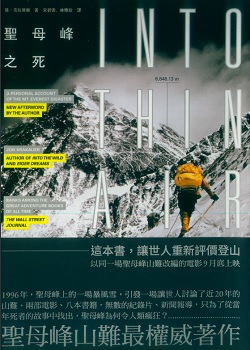Chapter 1 sequence
Human beings stage tragedies because they do not believe that there are tragedies in reality.
But tragedies, in fact, all happen in the civilized world.
Jose Ortega y Gasset
sequence
Why climb a mountain?Liu Zijie / Text
Getting close to the mystery of the disappearance of life and peeking at the taboo border of death are all exciting.I am a firm believer that mountaineering is a great activity, and that the inherent danger, far from detracting from its greatness, is what makes it great.
Why climb a mountain?
This is a question that every mountaineer and mountaineering enthusiast has asked himself or been asked.
I joined a mountaineering club when I was in college. I walked the suburban mountain trails comfortably and comfortably, and challenged more than ten days of vertical mountain walking. I used to wear crampons and kick snow steps forward in winter. I used to ski in the muddy middle-level mountains with fallen trees. Until recent years, I started overseas expeditions: trekking in the Himalayas in Nepal and the Meili Snow Mountain in Yunnan.
But why climb mountains?I still can't give the most accurate and definite answer, perhaps, I can use the title of this classic mountaineering book very cleverly and poetically: Why climb mountains?For into thin air.
To get into thin air?
Yes, that's right.Anyone who has been to a high altitude can experience the kind of altitude sickness with a splitting headache, nausea and vomiting, and adapt bit by bit. Breathe in and move forward, and feel the clarity, clarity, openness, and relief, and that definitely comes from the surrender and humility to nature and the thin air.
And another mountaineering fellow of mine told me more directly that she is not climbing for mountains, but for people. She likes to get along with people on the mountain regardless of you and me. After getting blisters and finally arriving at the camp, I ate, drank, stargazed, and talked with my teammates.
In places where the air is thin, in the deep mountains where supplies are scarce, and even on the ice walls where death is at every turn, how can we protect ourselves and help each other?It is a great test of human nature.I once walked the route of lack of water and food, walked to the starry sky, and dragged my pace with willpower. Suddenly, the senior who turned the corner in the mountain path ahead turned to me and shouted: Look at the big rock in front of you, take a rest Walk!I lowered my head, and there was half a box of long-lasting milk left by my senior on it.This 50CC of heavenly nectar really supported me to the camp.
I also lived in a high-altitude mountain hut where the water pipes were frozen. The owner melted the ice and snow and burned a bucket of water. All the climbers who stayed there relied on the bucket of water to brush their teeth and wash their faces all night, but the teammates of the other team took thermos bottles twice or three times. All of us were naked, and we could only chew gum, brush our teeth, and wipe our faces with wet paper towels in a single bunk.
Yes, the professionalism and love of the team leader, and the personality and ethics of the mountain friends have affected the whole climbing trip.This is also the most discussed and controversial part of this book.
A writer who loves mountaineering was invited by a magazine to go to Mount Everest to do a special report on the commercialization of mountaineering.Unexpectedly, the protagonist, that is, the author of this book, witnessed the largest mountain disaster on this sacred mountain. Twelve people were killed, and the place where a Japanese female climber died was only more than 300 meters away from him.And when the role of the interviewer becomes the return of survivors, does he have the right and obligation to record everything?
After the article was published, the author received a letter from the families of the victims to protest: Now that you have returned home safe and healthy, you have criticized other people's judgments and analyzed their intentions, behaviors, personalities, and motives.You judge the leaders, Sherpas, clients on what to do and arrogantly accuse them of their faults
The position of the author Krakul is clearly expressed in the subtitle of the original title: A Personal Account of the Mt. Everest Disaster (A Personal Account of the Mt. Everest Disaster). The logo becomes the sensational Death on Everest.
Why write?
Just as all writers can say: only through writing can healing and liberation be achieved."What happened on the mountain kept eating away at my courage," Krakul said.I thought writing this book might take Everest out of my life.
So, the last question, why should I read this book?
People who don’t climb mountains will watch mountaineering movies, and often watch them as disaster movies, watching the adventures, hardships, and close calls; this mountaineering literature is not just a disaster documentary report, it contains ethical dialectics, life and death gaze, Contains fear and hope Just as everyone's life has reached a place where the air is thin, this book may be used as a bottle of spare oxygen.

